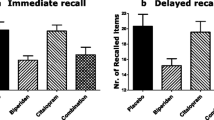Abstract
The scopolamine model of amnesia has been used to test the pharmacodynamic efficacy of oxiracetam in 12 healthy volunteers. The subjects were divided into four experimental groups, according to a double-blind cross over incomplete randomized block design. After a baseline neuropsychological examination, each subject received in two separate sessions one of the following treatments, as acute oral doses: oxiracetam 800, 1600, 2400 mg or placebo. One hour after treatment scopolamine hydrobromide (0.5 mg) was given subcutaneously. The cognitive performance was tested before and 1, 2, 3 and 25 h after scopolamine administration. Scopolamine caused a deterioration of performance of verbal episodic memory, semantic memory and attention tests. In comparison to placebo, oxiracetam improved the overall test performance, with a statistically significant difference at the dose of 1600 mg on delayed recall of word lists, and showed dose-related antagonism of scopolamine-induced effects also on semantic memory and attention. The efficacy of an acute dose of oxiracetam in reducing scopolamine-induced cognitive impairment supports the potential usefulness of this pharmacological model of amnesia for studying the effects of cognition enhancers in humans.
Similar content being viewed by others
References
Baddeley D, Bressi S, Della Sala S, Logie R, Spinnler H (1991) The decline of working memory in Alzheimer's Disease. Brain 114:2521–2542
Banfi S, Dorigotti L (1984) Experimental behavioural studies with oxiracetam on different types of chronic cerebral impairment. Clin Neurophys 7:768–769
Bartus R, Dean R, Beer B, Lippa A (1982) The cholinergic hypothesis of geriatric memory dysfunction: a critical review. Science 217:408–417
Beatty W, Butters N, Janowsky D (1986) Patterns of memory failure after scopolamine treatment: implications for cholinergic hypothesis of dementia. Behav Neural Biol 45:196–211
Bortolini U, Tagliavini C, Zampolli A (1972) Lessico di frequenza della lingua italiana contemporanea. Garzanti, Milan
Broks P, Preston G, Traub M, Poppleton P, Ward C, Stahl S (1988) Modelling dementia: effects of scopolamine on memory and attention. Neuropsychologia 26:685–700
Drachman D, Leavitt J (1974) Human memory and the cholinergic system. Arch Neurol 30:113–121
Ferrero E (1984) Controlled clinical trial of oxiracetam in the treatment of chronic cerebrovascular insufficiency in the elderly. Curr Ther Res 36:298–308
Flicker C, Serby M, Ferris S (1990) Scopolamine effects on memory, language, visuospatial praxis and psychomotor speed. Psychopharmacology 100:243–250
Ghoneim M, Mewaldt S (1977) Studies of human memory: the interactions of diazepam, scopolamine and physostigmine. Psychopharmacol 52:1–6.
Kopelman M (1986) The cholinergic neurotransmitter system in human memory and dementia: a review. Q J Exp Psychol 38A:535–573
Kopelman M, Corn T (1988) Cholinergic ‘blockade’ as a model for cholinergic depletion. A comparison of memory deficits with those of Alzheimer-type dementia and the alcoholic Korsakoff syndrome. Brain 111:1079–1110
Lezak MD (1983) Neuropsychological assessment. Oxford University Press, New York
Magnani M, Pozzi O, Banfi S, Biagetti R, Dorigotti L (1992) Oxiracetam antagonizes the disruptive effects of scopolamine on memory in the radial maze. Psychopharmacology 106:175–178
Mewaldt S, Ghoneim M (1979) The effects and interactions of scopolamine, physostigmine and metamphetamine on human memory. Pharmacol Biochem Behav 10:205–210
Ober B, Koss E, Friedlan R (1985) Processes of verbal memory failure in Alzheimer type dementia. Brain Cogn 4:90–103
Paivio A, Yuille J, Madigan S (1968) Concreteness, imagery and meaningfulness values for 925 nouns. J Exp Psychol 76:1–25
Parrott A (1986) The effects of transdermal scopolamine and four doses of oral scopolamine (0.15, 0.30, 0.6, 1.2 mg) upon psychological performance. Psychopharmacology 29:347–354
Pepeu G, Spignoli G, Magnani M (1989) The relationship between the behavioural effects of cognitive-enhancer's drugs and brain acetylcholine. Pharmacopsychiatry 22:116–118
Perry E, Tomlinson B, Blessed G, Bergmann K, Gibson P, Perry R (1978) Correlation of cholinergic abnormalities with senile plaques and mental test scores in senile dementia. BMJ 2:1457–1459
Petersen R (1977) Scopolamine-induced learning failures in man. Psychopharmacology 52:283–289
Ponzio F, Pozzi O, Banfi S, Dorigotti L (1988) Experimental evidence of oxiracetam direct activity on memory mechanisms. Psychopharmacology 96:71
Pozzi O, Allievi E, Biagetti R, Banfi S, Dorigotti L (1988) Behavioural screening for potential nootropic drugs. Pharmacol Res Common 20:315
Preston G, Ward C, Lines P, Poppleton P, Haigh J, Traub M (1989) Scopolamine and benzodiazepine models of dementia: cross-reversals by RO 15-1788 and physostigmine. Psychopharmacology 98:487–494
Rusted J, Warburton D (1989) Effects of scopolamine on verbal memory: a retrieval or acquisition deficit? Neuropsychobiology 21:76–83
Saletu B, Linzmayer L, Gruenberger J, Pietschwan H (1985) Double-blind, placebo controlled, clinical, psychometric and neuropsychological investigations with oxiracetam in the organic brain syndrome of late life. Neuropsychobiology 13:44–52
Villardita C, Grioli S, Lomeo C, Cattaneo C, Parini J (1992) Clinical studies with oxiracetam in patients with senile dementia of Alzheimer's type and multi-infarctual dementia of mild to moderate degree. Neuropsychobiology 25:24–28
Wechsler D (1945) A standardized memory scale for clinical use. J Psychol 18:87–95
Wechsler D (1955) The measurement of adult intelligence. Psychological Corporation, New York
Wesnes K, Simpson P, Kidd A (1987) The use of scopolamine model to study the nootropic effects of tenilsetam (CAS97). Med Sci Res 15:1063–1064
Wesnes K, Simpson P, Kidd A (1988) An investigation of the range of cognitive impairments induced by scopolamine 0.6 mg. Hum Psychopharmacol 3:27–43
Wesnes K, Anand R, Simpson P, Christmas L (1990) The use of a scopolamine model to study the potential nootropic effects of aniracetam and piracetam in healthy volunteers. J Psychopharmacol 4:246–254
Whitehouse P, Price D, Clark A, Coyle J, DeLong M (1981) Alzheimer's disease: evidence for selective loss of cholinergic neurons in the nucleus basalis. Ann Neurol 10:122–126
Author information
Authors and Affiliations
Rights and permissions
About this article
Cite this article
Preda, L., Alberoni, M., Bressi, S. et al. Effects of acute doses of oxiracetam in the scopolamine model of human amnesia. Psychopharmacology 110, 421–426 (1993). https://doi.org/10.1007/BF02244648
Received:
Revised:
Issue Date:
DOI: https://doi.org/10.1007/BF02244648




